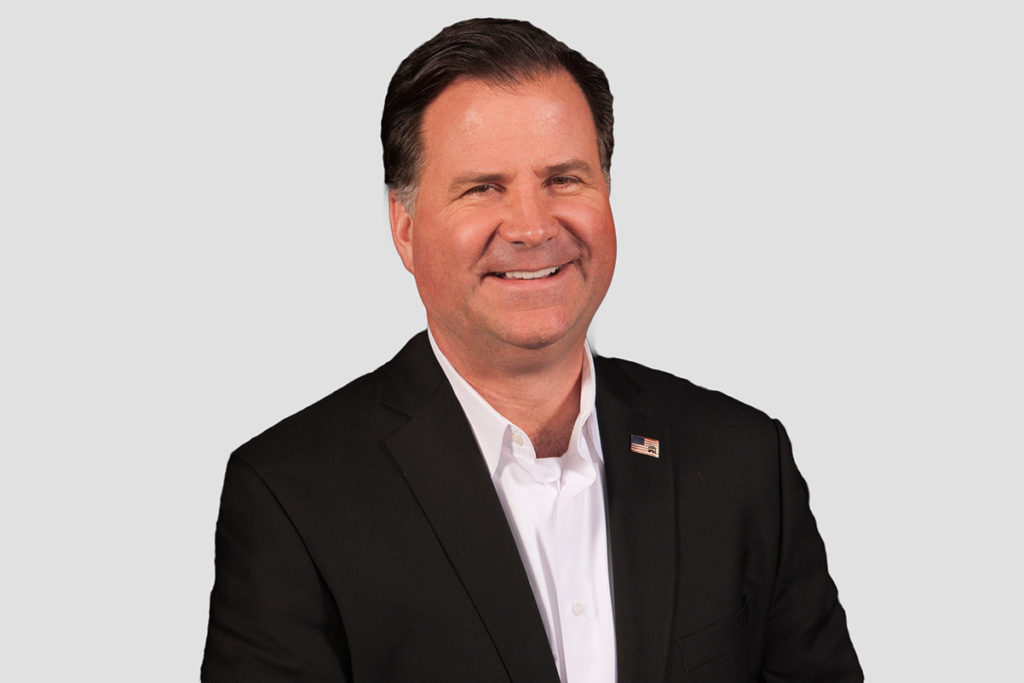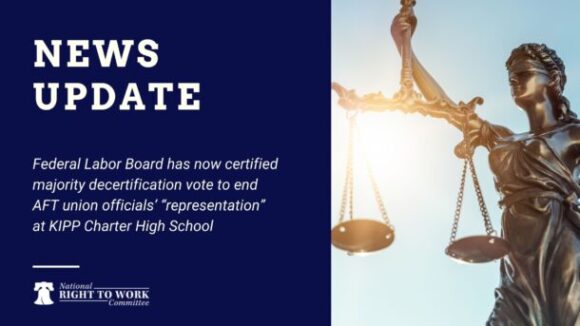Will Team Biden Weaponize Workers’ Pensions?
Big Labor abuse of worker pension and benefit funds as a means of advancing union bosses’ self-aggrandizing policy objectives is a familiar phenomenon.


Show transcript follows:
Lars: Welcome back to the Lars Larson show. I’ve told you that I am a dog in the fight when it comes to labor unions. I’m not crazy about them.
I’ve been forced to become a member on a couple of occasions and when I had those occasions I quickly moved to do what I could to decertify those labor unions because I didn’t want to be represented by those people.
I wanted to represent myself, and that goes all the way back to my 20’s. So if you wonder why I have a point of view about it, it’s because of that. It’s because of labor union thugs who told me, “You can’t work hard, Lars. If you do, you make everybody else look, uh, bad.” I said, “No, I make everybody else look average and I look better than average. There’s nothing wrong with that.”
So that’s why I looked forward to much to last year’s [National Right to Work Legal Defense Foundation-won ]Supreme Court decision, in the case of Mark Janus. In the Janus decision the U. S. Supreme Court said, “if you work for the government and you’re forced to be in a labor union because you don’t live in the minority of states that do not already have Right to Work Laws you don’t have to continue to be a member of that union.”
And already the unions have lost some percentage of their members because people now have a choice. They can say, “I want to belong or I don’t want to belong.”
Now that only applies to government workers. I’d like to see it go for the rest of the work force. Mark Mix joins me now. He’s president of the National Right to Work Committee. Mark, it’s good to have you back on the program.
MAM: Lars, it’s good to hear your voice and it’s an exciting time for us at Right to Work. I think the last time we were together you gave me a coin and we were talking about the Janus decision and what a great day it was for workers in the public sector, and like you, we’re hoping for a great day for private sector workers as well.
Lars: I gave you one of those challenge coins. On one side it says “illegitimi non carbarundum,” “don’t let the bastards grind you down.” Well in this case, I think we’re winning in this case. We have a majority of states that recognize workers’ Right to Work.
We have the Janus decision that says government employees that do not have to join a labor union if they choose not to. How do we get to this point and what’s happening in the Congress to extend this same kind of freedom to all Americans?
MAM: Well actually, Lars, it’s very simple. The bill that just got introduced in the United States Senate, by Senator Rand Paul, Kentucky, Senate Bill 525, is probably one of the shortest bills that’s been introduced in Congress in the last couple of decades. You know we’ve had bills of 2,300 pages and 1,600 pages that we have to pass before we know what’s in them.
Well, the Right to Work Law is a one-page bill that does not add a single word to federal law. It simply repeals the provisions in the 1935 labor policy, promulgated by Franklin Roosevelt, which forced American workers actually to join a private organization for the purpose of working. So what we’re going in and doing is we’re going into the Wagner Act and we’re repealing those provisions, saying that unionism should be voluntary. That’s all the bill does.
Lars: And Rand Paul has introduced this? Here’s my concern. I think that the president would sign this although you may tell me otherwise. But can we get a bill like this through the House of Representatives?
MAM: Yeah, we probably can. It would be a good fight but I think the American people deserve to know who is for freedom and who is for coercion. And a vote in either the Senate or the House would indicate that and would hold those politicians accountable as they continue to protect this special privilege by Organized Labor, to have a worker fired for failure to tender dues or fees.
That’s the important thing. I think we have the votes in the Senate. The president, when he was on the campaign trail, actually indicated that he would sign a National Right to Work law if we could get it to his desk. And I don’t think anything has changed on that front.
Lars: Ok, so what about the House of Representatives, when it goes over there? Am I wrong in assuming the majority of Democrats, maybe even all of the Democrats, will vote to support the labor unions, while the minority party, the Republicans, won’t have enough votes to get it passed? Or am I counting the noses wrong?
MAM: No, I think you’re probably counting them right, unfortunately, on issues like labor policy. Obviously Organized Labor [has been] using this forced unionism privilege to collect fees from workers who would not pay them if they had the choice. They turn around and use that money for politics and unfortunately, it gets focused on one particular political party. I don’t need to tell you who that is. I think you understand that.
Yeah, I don’t think, Richard Trumka and the AFL-CIO, and Jimmy Hoffa of the Teamsters Union, would ever let any Democrat off the hook on this vote. Their privilege has been in place for over 80 years, and it’s been a good privilege. It helps them collect over $20 billion a year in revenue. It makes for good political theater. They could use that money to elect candidates who give them power both at the state legislature and at the congressional level.
Lars: How do we get past that? Do we just have to wait until the House is back in Republican hands to be able to get real, real freedom for workers?
MAM: Well I think the most important step right now, Lars, is to get a vote. I mean, these politicians come to Washington and they don’t want to have any accountability at all. They can vote on milk of the month and insect of the month and cookie of the year, and naming post offices. But when it comes to substantive issues like this, like forcing an individual to pay money to a private organization for the privilege of working, they want nothing to do with the bill.
So Nancy Pelosi and her team in the House will probably do everything they can to stop this bill from coming up. There are a couple of opportunities I think. I mean shoot, AOC [Congresswoman Alexandria Ocasio-Cortez] was talking about green jobs and every job would be a union job. That sounds like something we could amend. Maybe they would allow us an opportunity to talk about freedom in the workplace, to bring back the debate if it comes up.
So I think the most important thing is the accountability, having a vote and then going back and having a dialogue with the American people about who’s for freedom and who’s for coercion
Lars: Well, I can’t wait to see that happen, because, Mark, I’ve enjoyed that kind of freedom most of my life. I only had a couple of short occasions where I had to belong to a labor union to take a job. That was offered to me in both television and radio and I hated it. I can cite all kinds of examples where the unions will really act like thugs toward their own members.
I felt that lash for a while and I remember telling a union shop steward who had come to me. I was working on documentaries on my days off and I won a bunch of awards for the documentaries and it advanced my career.
He said, “We’re going to stop you,” and I said, “How are you going to stop me from coming in on my own time?” He said, “We will file a grievance on your behalf against your employer demanding all the overtime we think that you’re due,“ and I was stunned.
I mean, I was in my early 20’s and I said, “Well, how can you do that,” and they said, “Well way back in the days, the early days of labor unions we got the freedom to be able to file a complaint on behalf of a worker that even the worker could not object to.”
And I understood why, back in those days, they would do that, they had some little old lady working in a shirtwaist factory, you know, in a shirts factory showing shirts.
She’d be told to take 10 shirts home with her and work on them at home and so they got the freedom of the contracts so they could file a complaint on behalf of the worker that event the worker couldn’t stop. But I was a professional worker. And I said, “what if I have my lawyer send you a letter on my behalf and say you can’t do that?” and he said, “We have the freedom to do that.”
And when I got that kind of treatment like that from a labor union that I was paying dues to that I didn’t want to be in anyway, I decided I’m going to find the quickest way out of here I possibly can. I hated that kind of relationship and I would think that most workers would hate that kind of relationship.
MAM: I think that’s right Lars, and that’s the power that was granted way back in 1935.
It’s called monopoly exclusive representation. They can speak for you even though you don’t want them to speak for you. You never asked them to speak for you. That’s the power that’s granted under federal law and this bill that we have introduced here will not end that exclusive bargaining privilege.
But it will certainly make them more accountable to workers, just like the Janus Decision did in the Supreme Court. Union officials will have to go out and attract members and there’s nothing in this bill that Senator Rand Paul just introduced, that would stop any worker from joining a union if they wanted to, but it has to be voluntary.
Lars: Absolutely. Mark, keep up the great work. We appreciate your time.
MAM: Thank you, Lars for the opportunity
Lars: That’s Mark Mix from the National Right To Work.

Big Labor abuse of worker pension and benefit funds as a means of advancing union bosses’ self-aggrandizing policy objectives is a familiar phenomenon.

What impact does handing a union monopoly power to deal with your employer on matters concerning your pay, benefits, and work rules have on your pay?

Federal Labor Board has now certified majority decertification vote to end AFT union officials’ “representation” at KIPP Charter High School